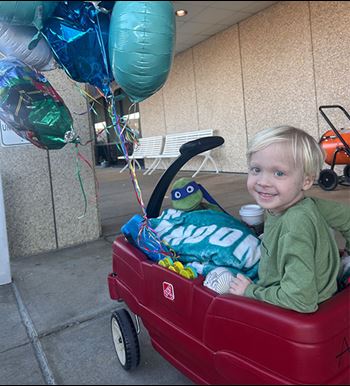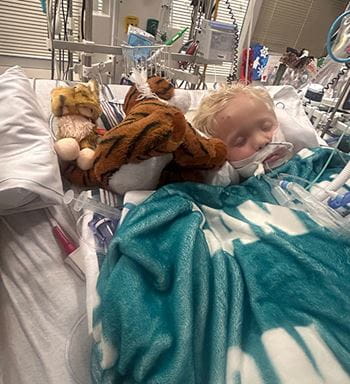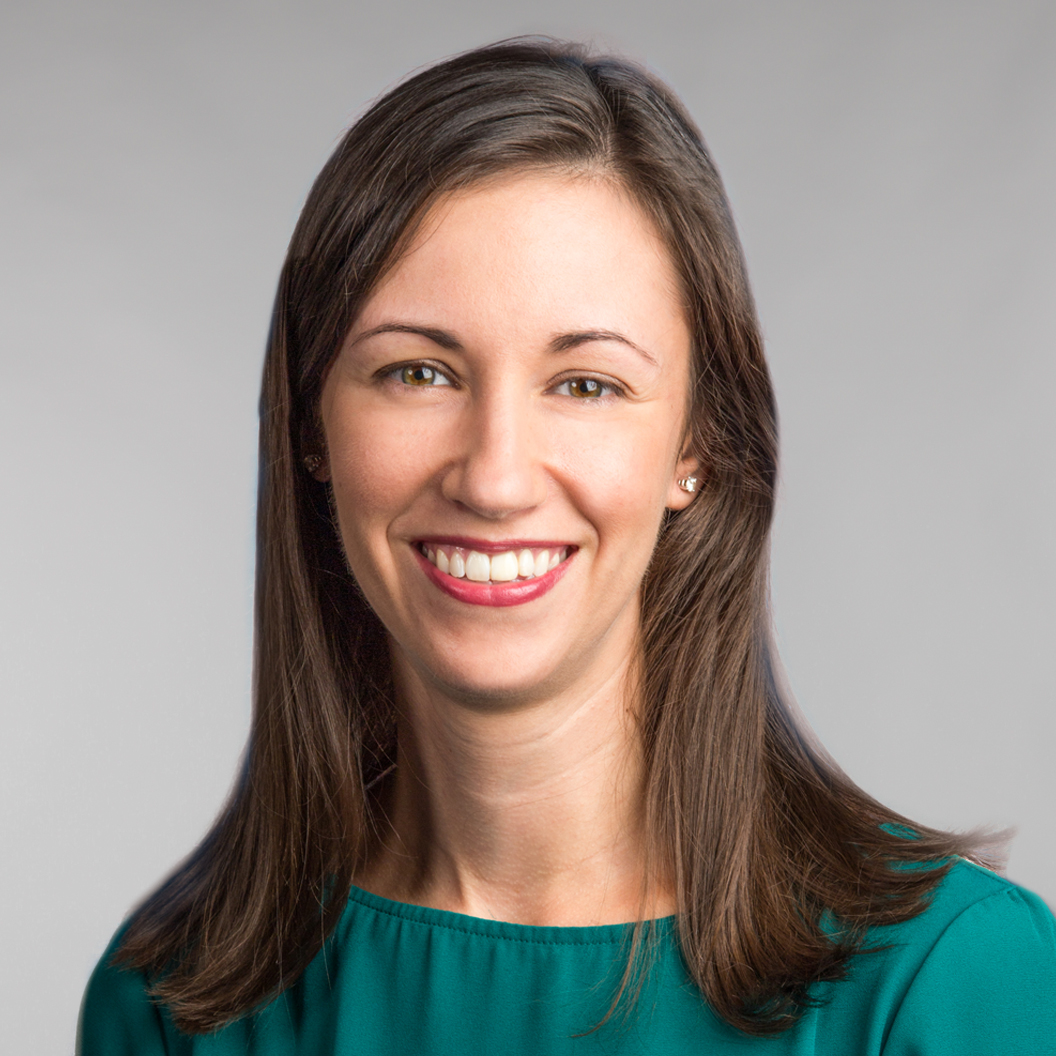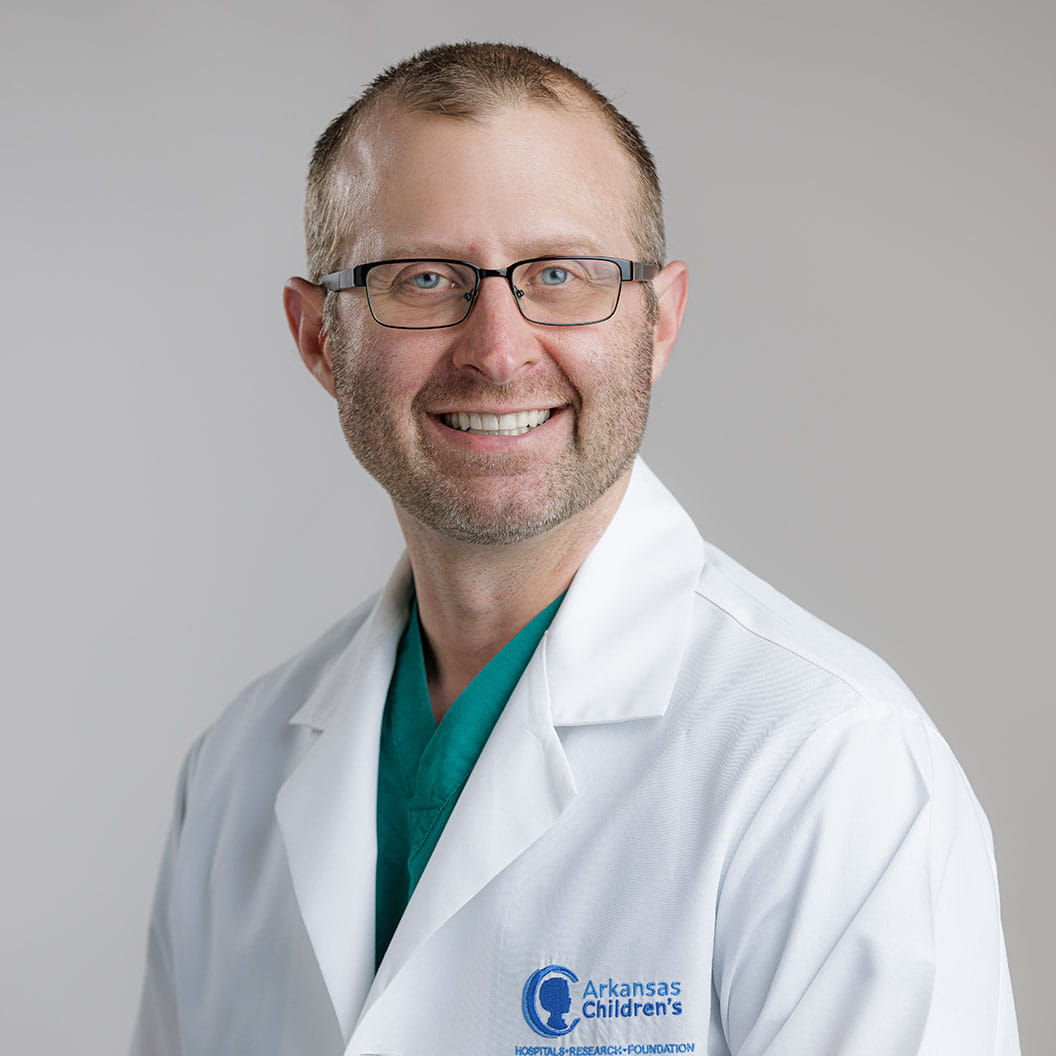Protect your family from respiratory illnesses. Schedule your immunization here >

Ranked nationally in pediatric care.
Arkansas Children's provides right-sized care for your child. U.S. News & World Report has ranked Arkansas Children's in seven specialties for 2025-2026.

It's easier than ever to sign up for MyChart.
Sign up online to quickly and easily manage your child's medical information and connect with us whenever you need.

We're focused on improving child health through exceptional patient care, groundbreaking research, continuing education, and outreach and prevention.

When it comes to your child, every emergency is a big deal.
Our ERs are staffed 24/7 with doctors, nurses and staff who know kids best – all trained to deliver right-sized care for your child in a safe environment.

Arkansas Children's provides right-sized care for your child. U.S. News & World Report has ranked Arkansas Children's in seven specialties for 2025-2026.

Looking for resources for your family?
Find health tips, patient stories, and news you can use to champion children.

Support from the comfort of your home.
Our flu resources and education information help parents and families provide effective care at home.

Children are at the center of everything we do.
We are dedicated to caring for children, allowing us to uniquely shape the landscape of pediatric care in Arkansas.

Transforming discovery to care.
Our researchers are driven by their limitless curiosity to discover new and better ways to make these children better today and healthier tomorrow.

We're focused on improving child health through exceptional patient care, groundbreaking research, continuing education, and outreach and prevention.

Then we're looking for you! Work at a place where you can change lives...including your own.

When you give to Arkansas Children's, you help deliver on our promise of a better today and a healthier tomorrow for the children of Arkansas and beyond

Become a volunteer at Arkansas Children's.
The gift of time is one of the most precious gifts you can give. You can make a difference in the life of a sick child.

Join our Grassroots Organization
Support and participate in this advocacy effort on behalf of Arkansas’ youth and our organization.

Learn How We Transform Discovery to Care
Scientific discoveries lead us to new and better ways to care for children.

Learn How We Transform Discovery to Care
Scientific discoveries lead us to new and better ways to care for children.

Learn How We Transform Discovery to Care
Scientific discoveries lead us to new and better ways to care for children.

Learn How We Transform Discovery to Care
Scientific discoveries lead us to new and better ways to care for children.

Learn How We Transform Discovery to Care
Scientific discoveries lead us to new and better ways to care for children.

Learn How We Transform Discovery to Care
Scientific discoveries lead us to new and better ways to care for children.

When you give to Arkansas Children’s, you help deliver on our promise of a better today and a healthier tomorrow for the children of Arkansas and beyond.

Your volunteer efforts are very important to Arkansas Children's. Consider additional ways to help our patients and families.

Join one of our volunteer groups.
There are many ways to get involved to champion children statewide.

Make a positive impact on children through philanthropy.
The generosity of our supporters allows Arkansas Children's to deliver on our promise of making children better today and a healthier tomorrow.

Read and watch heart-warming, inspirational stories from the patients of Arkansas Children’s.

Hello.

Arkansas Children's Hospital
General Information 501-364-1100
Arkansas Children's Northwest
General Information 479-725-6800

‘He Needed to Be in Arkansas’: Mobile ECMO Transport to Arkansas Children’s Saves Louisiana Flu Patient
April 28, 2025
 It all started with a cough for then-3-year-old Landon Sawyer of Louisiana. His fever spiked to 104.5 degrees. The next day, his oxygen level dropped, and what began as a typical case of the flu jeopardized his life.
It all started with a cough for then-3-year-old Landon Sawyer of Louisiana. His fever spiked to 104.5 degrees. The next day, his oxygen level dropped, and what began as a typical case of the flu jeopardized his life.
Over six weeks, the multispecialty team at Arkansas Children's Hospital (ACH) in Little Rock would save Landon's life. But, as his mother, Crystal Sawyer, a registered nurse, explained, the team did not just care for her son's medical needs. It was more.
It was the Angel One Transport team members who checked on him during his stay, long after they had safely transported Landon to ACH.
It was the wound care team who made sure every interaction with his delicate skin was met with extra comfort to prevent sores.
It was the child life specialists who helped Landon and his family celebrate his 4th birthday and Christmas with joyful smiles and toys.
It was the social worker who helped his parents get settled in the Ronald McDonald House and by his bedside, making sure every toiletry and food need was met.
It was the pastoral care team who prayed with them as Landon faced his unfolding health crisis.
It was the nurses taking him on wagon rides through the hospital after he was off sedation, helping ease his delirium.
It was a hospital full of team members, six hours from the Sawyers home in Prairieville, La., who quickly became family.
"From the time that we got there, it was like a well-oiled machine. That's the best way to describe it. It was almost like everybody could read each other's thoughts without even having to say it. Everybody was just all hands on deck the whole time," Crystal said. "As someone from the medical side, it was incredible to see. That work environment does not come easily. It was a blessing because you worry about sending your child to a hospital you have no background knowledge of. I just prayed, 'Please, please, God guide them and help them.' Everyone made sure our family was taken care of in whatever way we needed."
‘He would not have made it’
Crystal admitted that Landon, the youngest of three children, is a bit hard to describe in just a few words.
"He's just goofy and funny, and he always wants to make everyone laugh. He's definitely a class clown, and he's so quick-witted," she said. "He is my Sour Patch kid. Because just as he is sweet, he can be sour. He kind of likes to be the boss."
On Friday, Dec. 13, all three Sawyer children began feeling sick. They tested positive for flu A, and Crystal entered mom-nurse mode.
“On that Friday night when his fever broke, he was eating Doritos and cheese balls on the couch with my husband and laughing,” she said of Landon.
But his symptoms took a turn. His oxygen level fluctuated, dropping to 75% (normal levels should be 95% to 100%), and she took him to urgent care, as the emergency room was about 30 minutes away. It dropped to 58% at urgent care, and his heart rate was elevated. EMS quickly responded, and doctors at Our Lady of the Lake Children's Hospital in Baton Rouge intubated Landon, inserting a tube in his airway, allowing a ventilator to breathe for him. Despite being on the max amount of oxygen, he wasn't stabilizing.
Landon needed to be put on Extracorporeal Membrane Oxygenation (ECMO), medical technology that functions as an artificial heart and lung until a patient’s organ function improves. The attending physician was planning to send him to Children’s Hospital New Orleans for ECMO, but his CO2 level was undetectable and his blood pressure was too unstable. He would need medical transport with ECMO, and no hospital in the state had ECMO transport capabilities.
"I really felt like that was kind of God giving us a stop. Not to discredit Children's Hospital New Orleans, it's a wonderful hospital, but I think God just knew he needed to be in Arkansas," his mom said. "Arkansas wasn't even on the table before that. I didn't care if it was halfway across the world. We were going to do whatever we needed to do to get Landon what he needed."
The Angel One crew — consisting of Katherine Irby M.D., a pediatric intensivist at Arkansas Children’s and associate professor in pediatrics at the University of Arkansas for Medical Sciences (UAMS), two ECMO specialists, a respiratory therapist and a nurse — flew to Baton Rouge on a fixed-wing aircraft from the state to pick up Landon Dec. 15 and traveled back to ACH, with the entire trip taking around 10 hours.
"I've seen and been around a lot of really, really sick kids, but everything about him was screaming, 'Help me,'" said Debbie Izor, a pediatric critical care flight nurse on the Angel One team for 28 years and at ACH for 32. "ECMO is such a fabulous, amazing tool we have in our magic tricks. Without it, there's no way he could have even come to Arkansas Children's. He would not have made it."
The Angel One Transport team worked with the medical team in Baton Rouge to place Landon on ECMO.
"We are nationally known for our ECMO team, we were really the first ECMO transport team in the southeast region, and the only one for a long period of time," Dr. Irby said. "It's incredibly rewarding to be a provider at our institution. Knowing we're able to deliver expert care not only to children in our state, but also to those in surrounding states is truly fulfilling."
Six weeks of life-saving care
 The flu virus attacked Landon’s heart and lungs, and his body went into shock, shutting down the rest of his system from lack of circulation. He arrived at ACH early on Dec. 16, immediately becoming a pediatric intensive care unit (PICU) patient.
The flu virus attacked Landon’s heart and lungs, and his body went into shock, shutting down the rest of his system from lack of circulation. He arrived at ACH early on Dec. 16, immediately becoming a pediatric intensive care unit (PICU) patient.
Michele Moss, M.D., attending physician at the PICU and cardiovascular intensive care unit at ACH and professor of pediatrics at UAMS, took the initial phone call to accept Landon as an Arkansas Children's patient. She helped initiate the first mobile ECMO unit for Arkansas Children's in 1992, one of only three in the country at the time.
"For the patients that need ECMO but are not in a center with that capability, we have proven to be a very important and effective resource for them," Dr. Moss said. "Landon is a very good case in point. There is no question that he would have died had he not been put on ECMO when he did."
At Arkansas Children's, Landon continued to be on ECMO, which requires cannulas, or tubes, inserted into the body's large blood vessels, typically in the neck, chest or groin. One tube takes blood from the patient's body and the ECMO machine adds oxygen to the blood. After this, the blood is pumped through another tube back into the patient, with ECMO doing the work of the lungs and heart. Landon suffered from myocarditis, meaning heart muscle inflammation, where his heart was barely able to squeeze, his lungs had filled with fluid and his kidneys had stopped working, requiring dialysis.
Landon’s multispecialty care team included experts in the PICU, cardiology, nephrology, pulmonology, allergy and immunology, physical medicine and rehabilitation (PMR) and general surgery.
On Dec. 16, Robert Vandewalle, M.D., a pediatric surgeon at Arkansas Children’s and assistant professor in the departments of surgery and pediatric critical care medicine at UAMS, performed a life-saving exploratory laparotomy to release the pressure in Landon’s stomach that had filled with fluid pressing down on his organs, called compartment syndrome.
"I was so thankful because not every surgeon would do that surgery so quickly. He took that critical judgment call and made it within a couple of hours, and it made such a big difference," Crystal said.
In Baton Rouge, Landon started coughing up blood, and doctors determined he had necrotizing pneumonia due to a staph infection in his lungs and flu A. Because of this, his lungs needed rest, and ECMO gave his lungs time to heal. To make sure he remained comfortable, he was placed on sedation medicine and also a paralytic medicine so his muscles wouldn't move to allow the machines to do the work for his body.
During his month in the PICU, Landon received daily echocardiograms and EKGs, and he had a 24-hour electroencephalogram (EEG) to monitor his brain function, which stayed normal.
Landon experienced intense delirium after his sedation medicine was stopped.
"It was a traumatic time," his mom said, and he was transferred out of the PICU on Jan. 15 to the intermediate care unit with less stimulation. After spending a week doing occupational and physical therapy with PMR, he left ACH on Jan. 27, six weeks after he arrived.
"The fact that we have such a great ECMO program and the ability to do mobile ECMO is a blessing to kids not only in our state, but also to kids in surrounding states, like Landon. It quite literally allowed him to have the chance to live and recover and thrive from his illness," said Ashley Crow, APRN in pediatric critical care, who helped care for Landon in the PICU. "His recovery with little to no deficits is a true testament to the collaborative efforts of multiple teams within ACH and beyond."
‘One big family’
Today, Landon is "firing on all cylinders," his mom said. Arkansas Children's made her and her husband's six-week stay effortless, allowing them to focus on their son. Even though Landon was sedated in the PICU for his birthday and Christmas, child life specialists made sure he didn't miss his chance to celebrate.
"The child life program is incredible. He had gifts that he was able to open when he woke up. It didn't matter that he was on a ventilator and ECMO or whatever state he was in; they made sure that we felt the love for him and that he felt loved," Crystal said. "Every day, somebody checked in with us, and they made sure that our other two kids had things to play with and do whenever they came up for Christmas."
Izor said checking on Landon and his family during his hospital stay was just an example of the Arkansas Children’s “village.”
"That's just part of what we do," Izor said. "I've seen a lot of changes in our hospital, but the underlying factor that keeps Arkansas Children's Hospital what it is is the staff and the caring and compassion we have for our patients and our patient families."
The family created "Landon Strong" T-shirts with Arkansas colors to send to the ECMO team. It was another chance to thank them for going above and beyond, like when they brought him Louisiana State University-colored Mardi Gras beads and a Razorbacks shirt.
"Landon is a fighter and an absolute miracle," Crow said. "He arrived as one of the sickest kids I've seen to date and seemed to make a full recovery with little or no deficits. He is truly the reason that we do what we do."
While watching their son go through a life-threatening event was “absolutely terrifying,” Crystal said the family knew God led them to the right medical team, even across state lines.
"Besides having wonderful specialists that take every little detail into consideration, it just feels like one big family when you walk in. It feels like everybody is truly there for the same purpose and there to take care of your child," Crystal said. "It wasn't just stopping when we have one option - it was 'What's the best option?' I felt like all resources were completely exhausted in Arkansas versus leaving anything on the table. You can see the heart and soul of everybody that worked with Landon. You didn't feel like just a number; you didn't feel like just another patient. They truly gave everything they had and cared. It takes a special group of people to work with children, but it's above and beyond at Arkansas Children's Hospital."
This article was written by the Arkansas Children’s content team and medically reviewed by Katherine Irby, M.D.

Traveling to Arkansas Children's?
The Regional Care Center helps families traveling from another state or country receive world-class pediatric care before, during and after your stay.
Learn more about the Regional Care CenterMeet the Team
-

Olivia Irby, MD
Critical Care Medicine
Little Rock, Springdale -

Robert Vandewalle, MD
Critical Care Medicine, Surgery
Little Rock, Springdale
Related Services
-
Arkansas Children's Heart Institute
At Arkansas Children's Heart Institute, your care team is in your corner. From state-of-the-art technology to the art of caring, everything we do centered around providing the best possible outcome for your family.
-
Nephrology (Kidney Disorders)
At Arkansas Children’s in Little Rock, Arkansas, our nephrology team provides specialized care for patients with a wide range of kidney, urinary tract and hypertension issues.
-
General Surgery Clinic
The General Surgery Clinic at Arkansas Children's provides surgical care for hernias, chest wall deformities, and other conditions.
-
Physical Medicine and Rehabilitation (PM&R)
Physical Medicine and Rehabilitation provides specialty medical services for children, adolescents and selected young adults with physical disabilities.
-
Pediatric Intensive Care Unit (PICU)
The ACH Pediatric Intensive Care Unit provides care for children suffering from respiratory illnesses, pediatric trauma, septic shock, and diabetic ketoacidosis.
-
ECMO Program (Extracorporeal Membrane Oxygenation)
Extracorporeal life support (ECLS) program includes Extracorporeal Membrane Oxygenation(ECMO) to provide life-saving support for critically ill children.

Appointments
New and existing patients can visit our appointment hub for several ways to request an appointment, including online scheduling for many services.
Request an appointment
